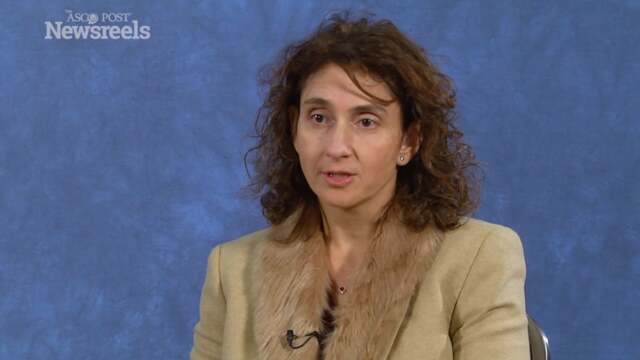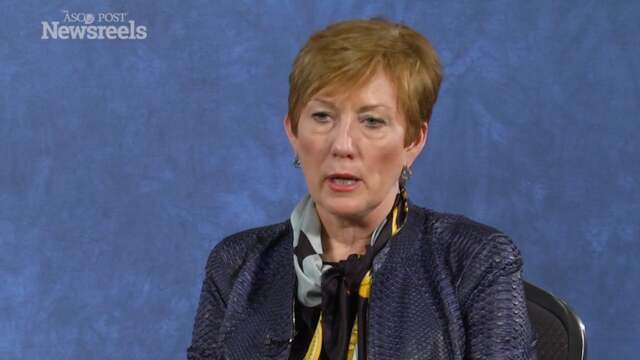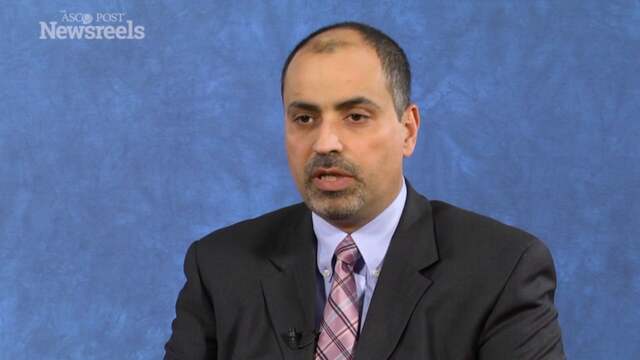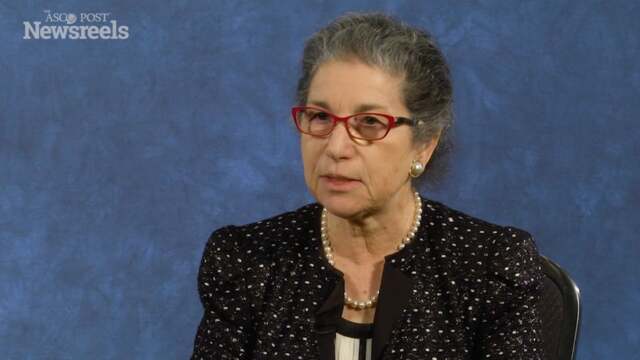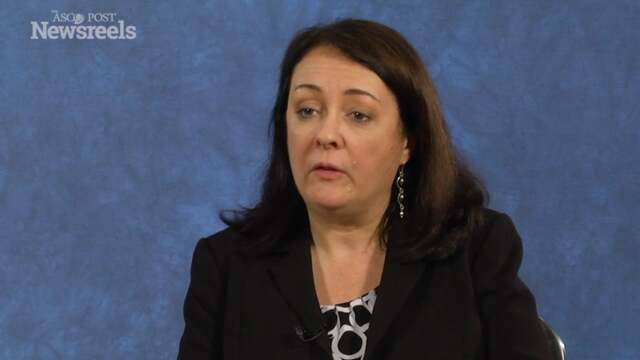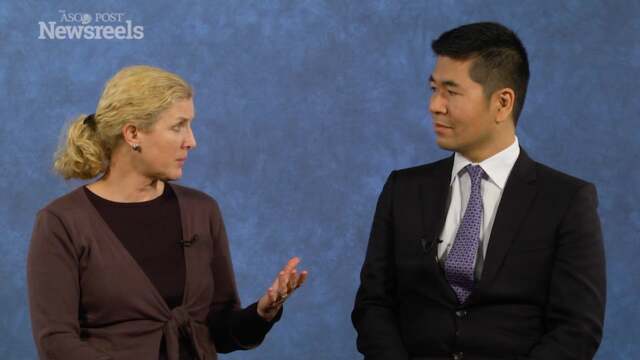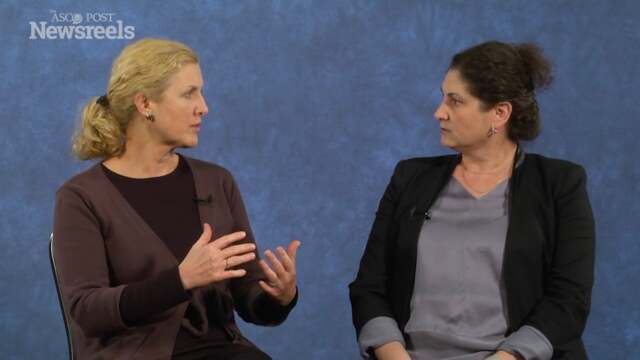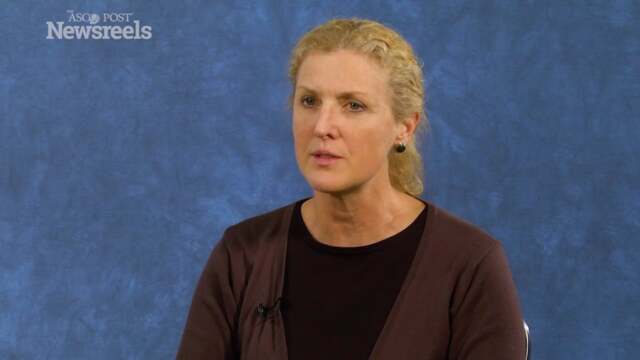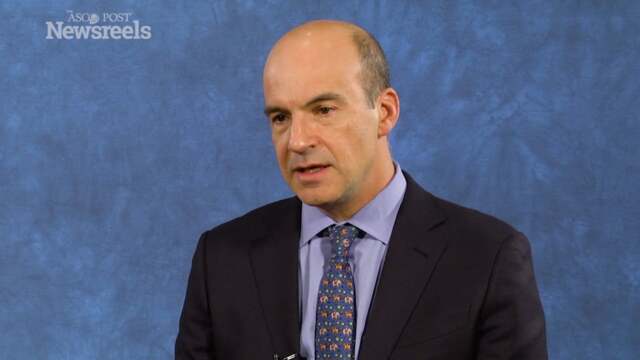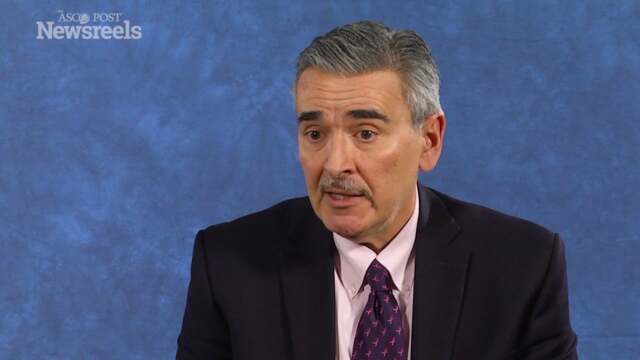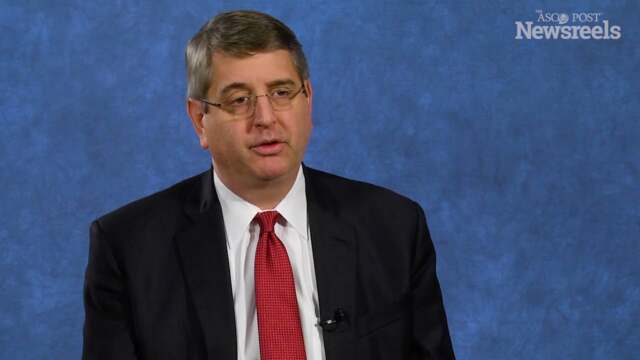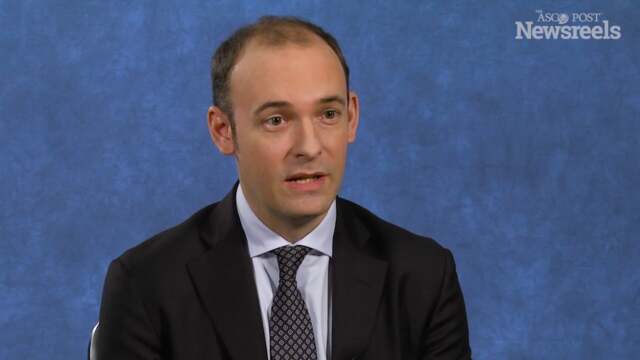ESMO Asia 2016: Almost 20% of Swedish Breast Cancer Patients Fail to Complete Prescribed Endocrine Therapy
Around 20% of patients with breast cancer in Sweden do not complete endocrine therapy, according to research that will be reported at the ESMO Asia 2016 Congress (Abstract 62O_PR), to be held December 16–19 in Singapore.The study in over 5,500 women found that younger patients and those who...
Effectiveness of Electroacupuncture for Sleep Disturbances in Patients With Breast Cancer and Hot Flashes
Studies suggest that approximately 30% to 40% of women with breast cancer report persistent hot flashes. Nocturnal hot flashes are among the most problematic because they can contribute to poor sleep. A new study published by Garland et al in Menopause shows that electroacupuncture may be effective ...
Aleix Prat, MD, PhD, on HER2-Positive Breast Cancer: First Results of the PAMELA Trial (Spanish Language Version)
Aleix Prat, MD, PhD, of the University of Barcelona, discusses in Spanish study findings on intrinsic subtype as a predictor of pathologic complete response following neoadjuvant dual HER2 blockade without chemotherapy in HER2-positive breast cancer (Abstract S3-03).
Phase III Trial Shows Improved Progression-Free Survival With Fulvestrant vs Anastrozole in Hormone Receptor–Positive Advanced Breast Cancer
In the international phase III FALCON trial reported in The Lancet, Robertson et al found that progression-free survival was improved with intramuscular fulvestrant (Faslodex) vs oral anastrozole in endocrine therapy–naive women with hormone receptor–positive locally advanced or...
SABCS 2016: IBM Watson for Oncology Platform Shows High Degree of Concordance With Physician Recommendations
The artificial-intelligence platform Watson for Oncology (WFO) achieved a high degree of concordance with the recommendations of a panel of oncologists in a double-blinded validation study, according to results presented at the 2016 San Antonio Breast Cancer Symposium, held December 6 to 10...
SABCS 2016: Aromatase Inhibitors Were Associated With Reduced Endothelial Function in Postmenopausal Breast Cancer Patients
Postmenopausal women with breast cancer who took aromatase inhibitors demonstrated endothelial dysfunction, a predictor of cardiovascular disease, according to study results presented at the 2016 San Antonio Breast Cancer Symposium, held December 6 to 10 (Abstract s5-07). Aromatase inhibitors are...
Virginia G. Kaklamani, MD, DSc, on Early Breast Cancer: Year in Review
Virginia G. Kaklamani, MD, DSc, of The University of Texas Health Science Center, discusses new directions in prevention, early detection, and treatment of early-stage breast cancer, using genomic tests and targeted therapies.
Monica Morrow, MD: Brinker Award Lecture Summary on Changing Paradigms in Local Therapy of Breast Cancer
Monica Morrow, MD, of Memorial Sloan Kettering Cancer Center, recognized at this year’s meeting for scientific distinction in clinical research, summarizes her Brinker Award lecture on modifying local therapy to decrease the burden of cancer treatment.
S.P. Somashekhar, MBBS, MCh(Onco), on Watson for Oncology: A Validation Study for Breast Cancer
S.P. Somashekhar, MBBS, MCh(Onco), of the Manipal Comprehensive Cancer Centre, discusses a study to assess the performance of IBM's artificial intelligence platform in comparison to a multidisciplinary tumor board (Abstract S6-07).
Eric P. Winer, MD: The McGuire Lecture
Eric P. Winer, MD, of the Dana-Farber Cancer Institute, summarizes his McGuire lecture on the past and future of breast cancer treatment.
Mothaffar Rimawi, MD, on HR-Positive, HER2-Positive Breast Cancer: Results of the NRG Oncology/NSABP B-52 Trial
Mothaffar Rimawi, MD, of the Smith Breast Center at Baylor College of Medicine, discusses phase II findings from a study evaluating pathologic complete response in patients with HR-positive, HER2-positive disease treated with neoadjuvant docetaxel, carboplatin, trastuzumab, and pertuzumab with or without estrogen deprivation (Abstract S3-06).
Patricia A. Ganz, MD: Aromatase Inhibitors Data Review
Patricia A. Ganz, MD, of the UCLA Jonsson Comprehensive Cancer Center, summarizes two studies on using duloxetine for aromatase inhibitor–associated musculoskeletal symptoms, and aromatase inhibitors’ effect on endothelial function and heart disease (Abstracts S5-06 and S5-07).
Matthew P. Goetz, MD, on Advanced Breast Cancer: Expert Perspectives
Matthew P. Goetz, MD, of the Mayo Clinic, reviews progress made during the past year on treatment of advanced disease.
Ruth O'Regan, MD, on Locally Advanced and Metastatic Breast Cancer: Results of the BELLE-3 Trial
Ruth O'Regan, MD, of the University of Wisconsin, discusses study findings on buparlisib plus fulvestrant in postmenopausal women with HR-positive, HER2-positive, aromatase inhibitor–treated, locally advanced or metastatic breast cancer, who progressed on or after mTOR inhibitor–based treatment (Abstract S4-07).
Lisa A. Carey, MD, and Maki Tanioka, MD, on HER2+ Breast Cancer: Results From the CALGB 40601 Alliance Trial
Lisa A. Carey, MD, and Maki Tanioka, MD, both of the University of North Carolina, discuss study findings on weekly paclitaxel and trastuzumab with or without lapatinib for HER2-positive breast cancer (Abstract S3-05).
Lisa A. Carey, MD, and Ingrid A. Mayer, MD, on Triple-Negative Breast Cancer: Treatment Challenges
Lisa A. Carey, MD, of the University of North Carolina, and Ingrid A. Mayer, MD, of the Vanderbilt-Ingram Cancer Center, discuss the current studies on neoadjuvant systemic treatment in the triple-negative disease setting.
Lisa A. Carey, MD, on SABCS Meeting Highlights: Expert Perspective
Lisa A. Carey, MD, of the University of North Carolina, discusses a session she moderated on key data presented at SABCS, and gives her expert views on putting the research data into clinical practice.
Peter Bach, MD, on The Global Cost of Cancer Care
Peter Bach, MD, of Memorial Sloan Kettering Cancer Center, summarizes his plenary lecture on drug costs and their effect on the affordability of cancer care worldwide (Plenary Lecture 3).
Nikhil Wagle, MD, on Breast Cancer: Advances in Genomics
Nikhil Wagle, MD, Dana-Farber Cancer Institute, discusses the genomic sequencing of ER-positive metastatic breast cancer that has become resistant to therapies and the implications for the choice of next therapy, clinical trial eligibility, and novel drug targets (Abstract S1-01).
Joseph A. Sparano, MD, on Early-Stage Breast Cancer: Findings on the Tumor Microenvironment
Joseph A. Sparano, MD, of the Montefiore Medical Center, discusses the tumor microenvironment of metastasis score and its association with early distant recurrence in HR-positive, HER2-negative early-stage breast cancer (Abstract S4-04). To view a short film on capturing imaging inside breast cancer tumors, go to: https://www.youtube.com/watch?v=q_JDp-VePAs
Hyo Sook Han, MD, on Metastatic Breast Cancer: Trial Results on Veliparib, Carboplatin, and Paclitaxel
Hyo Sook Han, MD, of Moffitt Cancer Center, discusses phase II study findings on the efficacy and tolerability of veliparib in combination with carboplatin and paclitaxel vs placebo in patients with BRCA1 or BRCA2 mutations and metastatic breast cancer (Abstract S2-05).
Anne Hudson Blaes, MD, on Aromatase Inhibitors and Cardiovascular Disease
Anne Hudson Blaes, MD, of the University of Minnesota, discusses the association between aromatase inhibitors, endothelial function, and early heart disease (Abstract S5-07).
Jame Abraham, MD, on Hair Loss: SCALP Trial Results
Jame Abraham, MD, of the Cleveland Clinic, discusses findings of the Scalp Cooling Alopecia Prevention trial for patients with early-stage breast cancer (Abstract S5-02).
Jame Abraham, MD, on ER-Positive Breast Cancer: Expert Perspective on Initial Results of NRG Oncology/NSABP B-42
Jame Abraham, MD, of the Cleveland Clinic, gives his perspective on study results of extended adjuvant endocrine therapy in postmenopausal women with estrogen receptor–positive breast cancer who have completed previous adjuvant endocrine treatment (Abstract S1-05).
SABCS 2016: Scalp-Cooling Device Safe and Effective in Reducing Chemotherapy-Induced Alopecia in Women With Breast Cancer
Although adjuvant chemotherapy decreases the risk of breast cancer recurrence, it is associated with distressing side effects, including hair loss. A prospective randomized trial evaluating the safety and efficacy of the Orbis Paxman Hair Loss Prevention System (OPHLPS), a scalp-cooling device that ...
Ruth O’Regan, MD, and Ann H. Partridge, MD, on The NRG Oncology/NSABP B-42, IDEAL, and DATA Studies
Ruth O’Regan, MD, of the University of Wisconsin, and Ann H. Partridge, MD, of the Dana-Farber Cancer Institute, discuss study findings from a session Dr. O’Regan moderated on three major trials addressing anastrozole after tamoxifen in HR-positive early breast cancer, letrozole in HR-positive disease, and extended letrozole treatment after adjuvant endocrine therapy (Abstracts S1-03, S1-05, S1-08).
SABCS 2016: Neoadjuvant Abemaciclib Treatment May Benefit Patients With Early-Stage Hormone Receptor–Positive, HER2-Negative Breast Cancer
Presurgical treatment with the investigational therapeutic abemaciclib, either alone or in combination with the aromatase inhibitor anastrozole, reduced levels of Ki67, a marker of cell proliferation, in hormone receptor–positive, HER2-negative breast cancer cells, compared with anastrozole...
SABCS 2016: BELLE-3 Trial of Buparlisib Plus Endocrine Therapy Meets Primary Endpoint of Progression-Free Survival in Breast Cancer Patients
The investigational PI3K inhibitor buparlisib, in combination with endocrine therapy, improved outcomes for patients with hormone receptor–positive advanced breast cancer that had progressed after treatment with everolimus (Afinitor) plus exemestane, according to data from the phase III...
SABCS 2016: Adding Veliparib to Chemotherapy Improved Response Rates Among Patients With BRCA-Mutant Breast Cancer
Adding the investigational poly ADP ribose polymerase (PARP) inhibitor veliparib to carboplatin and paclitaxel chemotherapy improved the overall response rate without increasing adverse events among patients who had locally recurrent or metastatic breast cancer with BRCA1 or BRCA2 mutations,...
Samuel Smith, PhD, on Tamoxifen Adherence: Results of the IBIS-1 Study
Samuel Smith, PhD, of Queen Mary University of London, discusses study findings on menopausal symptoms as predictors of long‐term adherence in an International breast cancer intervention study (Abstract S5-03).
Harold J. Burstein, MD, PhD, on Adjuvant Endocrine Therapy: Expert Perspective
Harold J. Burstein, MD, PhD, from Dana-Farber Cancer Institute, gives an update on the duration of adjuvant endocrine therapy and offers his expert views on putting the research data into clinical practice.
Sara A. Hurvitz, MD, on HR-Positive, HER2-Negative Breast Cancer: Results of the neoMONARCH Trial
Sara A. Hurvitz, MD, of the UCLA Jonsson Comprehensive Cancer Center, discusses findings on the biological effects of abemaciclib in a neoadjuvant study for postmenopausal patients (Abstract S4-06).
Aleix Prat, MD, PhD, on HER2-Positive Breast Cancer: First Results of the PAMELA Trial
Aleix Prat, MD, PhD, of the University of Barcelona, discusses study findings on intrinsic subtype as a predictor of pathologic complete response following neoadjuvant dual HER2 blockade without chemotherapy in HER2-positive breast cancer (Abstract S3-03).
Ruth O’Regan, MD, and Ann H. Partridge, MD, on HER2+ Breast Cancer: Results From the CLEOPATRA Trial
Ruth O’Regan, MD, of the University of Wisconsin, and Ann H. Partridge, MD, of the Dana-Farber Cancer Institute, discuss study findings on the prognostic associations of TILs in metastatic HER2-positive breast cancer (Abstract S1-04).
SABCS 2016: Radiation Therapy May Increase Complications in Breast Cancer Patients Receiving Implants
Radiotherapy increased complications and impaired patient-reported satisfaction with reconstructed breasts in breast cancer patients who received implant reconstruction, but not in those who received autologous reconstruction, according to data from a large, prospective, multicenter cohort study...
SABCS 2016: Adding Ibandronate to Hormone Therapy Did Not Improve Outcomes for Postmenopausal Breast Cancer Patients
Postmenopausal women with hormone receptor–positive early-stage breast cancer who received the bisphosphonate ibandronate (Boniva) in addition to adjuvant hormone therapy did not have improved disease-free survival outcomes, according to data from the phase III clinical trial TEAM IIB...
SABCS 2016: No Added Benefit With Aromatase Inhibitor as Part of Presurgical Therapy for Hormone Receptor–Positive, HER2-Positive Breast Cancer
Adding an aromatase inhibitor to presurgical treatment with docetaxel, carboplatin, trastuzumab (Herceptin), and pertuzumab (Perjeta) did not significantly increase or decrease the percentage of patients with hormone receptor–positive, HER2-positive breast cancer who had a pathologic...
SABCS 2016: Axillary Lymph Node Dissection Might Be Avoidable for Certain Early-Stage Breast Cancer Patients Receiving Neoadjuvant Chemotherapy
A sentinel lymph node biopsy during surgery that showed no signs of cancer was associated with a low risk for breast cancer recurrence in the axillary lymph nodes for patients with large, operable breast tumors and no clinical signs of the cancer in the axillary lymph nodes prior to neoadjuvant...
Stephen R.D. Johnston, MBBS, PhD, and Ann H. Partridge, MD, on Breast Cancer: Managing Metastatic ER+ Disease
Stephen R.D. Johnston, MBBS, PhD, of The Royal Marsden NHS Foundation Trust, and Ann H. Partridge, MD, of the Dana-Farber Cancer Institute, discuss the role of endocrine therapy and optimal sequencing, recent progress in first-line treatment, and resistance pathways and second-line treatment (Plenary Lecture 1).
Jennifer K. Litton, MD, and Ann H. Partridge, MD, on Breast Cancer in Young Women
Jennifer K. Litton, MD, of MD Anderson Cancer Center, and Ann H. Partridge, MD, of the Dana-Farber Cancer Institute, discuss a range of issues for young women with breast cancer, including epidemiologic and biologic differences in younger patients, fertility issues, and pregnancy-associated breast cancer (Poster Discussion 6).
Dawn Hershman, MD, on Breast Cancer Survivorship: Poster Discussion
Dawn Hershman, MD, of the Herbert Irving Comprehensive Cancer Center at Columbia University Medical Center, reviews findings on survivorship care plans, interventions to reduce chemotherapy-induced peripheral neuropathy, and the cardiac effects of aromatase inhibitors (Poster Discussion 4).
Jennifer A. Ligibel, MD, on Gene Expression: Study Findings
Jennifer A. Ligibel, MD, of Harvard Medical School, discusses the impact of preoperative exercise on breast cancer gene expression (Abstract S5-05).
Rowan T. Chlebowski, MD, PhD, on Diet and Breast Cancer: Trial Results
Rowan T. Chlebowski, MD, PhD, of the David Geffen School of Medicine at UCLA, discusses findings from the Women’s Health Initiative Dietary Modification study on low-fat diet and breast cancer overall survival (Abstract S5-04).
Mylin A. Torres, MD, to Hold Glenn Family Chair in Breast Cancer Research at Winship Cancer Institute
Mylin A. Torres, MD, Director of the Glenn Family Breast Center at Winship Cancer Institute of Emory University (Winship), was selected to hold the Louisa and Rand Glenn Family Chair in Breast Cancer Research. The endowed position was created by the Wilbur and Hilda Glenn Family Foundation to...
Diana M. Eccles, MD, on Young Breast Cancer Patients: Results From the POSH Study
Diana M. Eccles, MD, of the University of Southampton, discusses findings from a study of sporadic and hereditary breast cancer and whether BRCA status affects outcome in young breast cancer patients (Abstract S2-03).
Sonja Vliek, MD, and Sabine Linn, MD, PhD, on Early Breast Cancer: Results of the TEAM IIb Trial
Sabine Linn, MD, PhD, and Sonja Vliek, MD, both of the Netherlands Cancer Institute, discuss study findings on adjuvant ibandronate in postmenopausal women with early breast cancer (Abstract S6-02).
Treatment of Early HER2-Positive Breast Cancer: One Size Does Not Fit All
Despite the routine use of HER2 blockade in early HER2-positive breast cancer, clinicians can always benefit from a refresher on key treatment considerations. Clinical pearls and controversial issues were the topic of a presentation at the 14th Annual School of Breast Oncology at Emory University, ...
Fergus J. Couch, PhD, and Max S. Wicha, MD, Recognized for Significant Contributions to Breast Cancer Research at 2016 SABCS
The American Association for Cancer Research (AACR) honored two renowned researchers for their work in breast cancer at the 2016 San Antonio Breast Cancer Symposium (SABCS), held December 6–10 in San Antonio, Texas. Fergus J. Couch, PhD, of the Mayo Clinic, will receive the 9th Annual AACR...
SABCS 2016: Extended Letrozole Therapy Showed Limited Benefit in Postmenopausal Women With Early-Stage, Hormone Receptor–Positive Breast Cancer
Five additional years of hormone therapy with letrozole following an initial 5 years of aromatase inhibitor-based adjuvant hormone therapy did not demonstrate a statistical improvement in disease-free survival or overall survival in postmenopausal women with early-stage hormone...
SABCS 2016: Adding Everolimus to Fulvestrant Improved Outcomes for Postmenopausal Patients With Hormone Receptor–Positive Breast Cancer
Progression-free survival was more than doubled for patients with metastatic hormone receptor–positive, HER2-negative breast cancer resistant to aromatase inhibitor therapy by adding everolimus (Afinitor) to treatment with the endocrine therapeutic fulvestrant (Faslodex), according to data...

